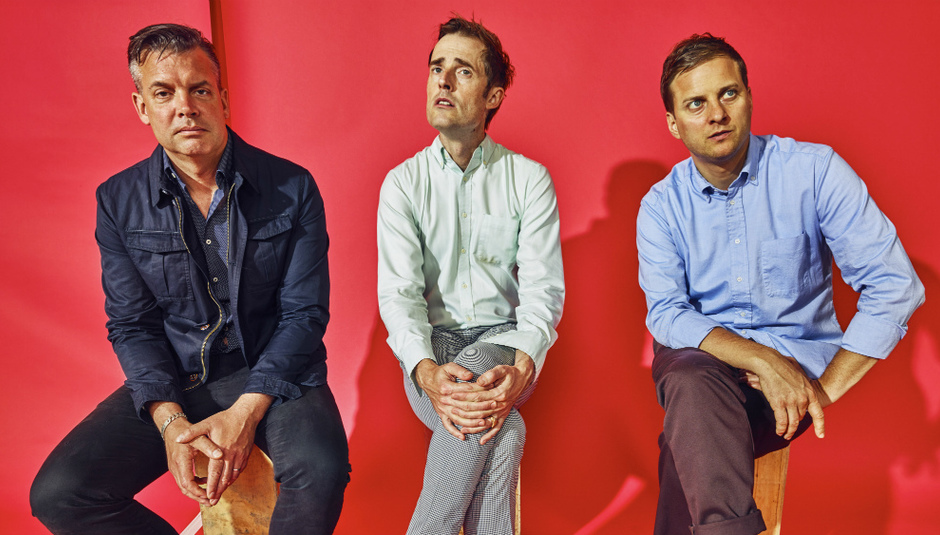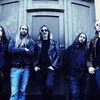I get really tense before interviews. A particular kind of music fan/journo guilt, which lies somewhere in the feeling that I’m distracting an artist from one of: making music, breaking hearts, or indulging in some well-earned kip after the first two.
When it’s Battles, the Back to the Future 2 vision of what a model rock band should be in 2015, who are in the midst of a helter-skelter tour that takes them everywhere from Tennessee to Tokyo via Turin… well that feeling dials up a notch.
Fortunately, when I’m put on the phone to John Stanier, he of the highest cymbal in rock and a face that looks like Jason Sudeikis if Jason Sudeikis was capable of breaking walls with his bare hands, it’s clear he’s probably also uncomfortable. Fresh out of the tour bus shower, shirtless, with no idea this interview was happening, I declare the ice broken.
DiS: I first saw Battles at Latitude Festival in 2012. Purely as a piece of Battles performance art, it was probably the ideal show to have seen. Plagued by technical difficulties, nothing seemed to be working, leading to a build of tension – abstract bursts of noise, the hum of conversation, screens popping to life and frazzling to the grave again. This goes on for 20 minutes. Which means that for the 4 songs, when you got the chance to explode, you absolutely did. Then the technical difficulties came back and you left the stage.
JS: I remember that one. We got totally zapped the moment we plugged in, because the stage was wired wrong or something. So it actually wasn’t really us, the power on the stage blew up a lot of our gear. Being the drummer I don’t know the exact technical specifics of it, but it was pretty scary. That sucked, it was in front of a lot of people too.
DiS: Speaking as one of those people, with hindsight it actually worked - given, you’re all about the build, it kind of felt like one long abstract introduction.
Oh cool.
DiS: Because your music is so technical – both in structure and equipment – is that kind of complication, indicative of how complicated it is to build your music and by extension how complicated the show is to put together?
JS: With the equipment that we use, for sure, things can go wrong, but nothing has ever been that bad. In fact, now, a lot of that was the vocals and the screen and we’re not using that now, so it’s actually been smooth sailing ever since… luckily, knock on wood.
DiS: There’s a complication thing, and there’s also a time thing. The reason I bring it up really, is because in the build-up to La Di Da Di, with the video ‘The Gabba’ and the Ableton interview, you’ve been playing up a main theme of the band: The Art of Repetition.
DiS: What does that phrase mean to you, and how does it come to bear on La Di Da Di?
JS: The band, Battles has 100% always been about the root element of looping, definitely. Since Day one it has always been about loops. “The Art of Repetition” is referencing to the trance-like quality of what we do with loops and how we use loops and how each of us plays onto and into loops in totally different ways.Dave will photograph himself and manipulate that, and Ian will use his Ableton to do a repetitive loop over and over again. We’re all over the place regarding that. The root element of everything is always just loops, definitely.
DiS: You touch on the nice match there between chaos and planning. It reminded of that phrase: “Insanity is doing the same thing over and over again and expecting different results”. The art of repetition suggests doing the same thing over and over again to create different results.
Right.
DiS: The two come together even in the band name: Battles. In itself, that process you plan how a battle plays out, but it obviously chaos ensues in the moment.
Sure, we chose the name Battles because it was a strong, one-word name. Actually, we chose the name, because you can’t really – in the beginning – you couldn’t really tell what that meant, like – were we a metal band, it could be anything. It was left completely open. That’s the reason we called ourselves Battles in the very beginning, if that’s what the question is.
DiS: As you say, Battles was chosen to be a strong single-point name, but obviously from that point it can be interpreted in different ways: an echo chamber of sorts. In the same way, the band have now done pretty much every possible way of being Battles: writing individually, having a consistent lead singer, having guest vocalists, La Di Da Di being a purely instrumental record. With all that change around you and having loops as your basis, how much does that gives your music scope for change?
JS: It’s a good question, but I don’t how much it has to do with it. We could do a Dixieland record next, there’s no way of knowing really.
I think that technology allows you to change in ways that you wouldn’t probably be able to you if you just used the same instruments over and over again. Something that’s really important to us, is that I have the exact same set-up that I’ve always had, I never change. I’m the constant, so I have to keep re-inventing the wheel every record. Dave is still totally analog, but he changes a little bit with his stuff, whereas Ian has a radically different set-up on every record we make. He’s using newer, or completely different stuff. That right there, makes us move forwards but retain our identity in a way. We change but not too much. I wouldn’t want to be super all over the place. That’s the main reason I don’t have any electronic drums or stuff like that. There’s a ying and a yang within Battles, there’s got to be a constant that allows you to change, but not too much, and to retain some form of dignity.
DiS: It’s a good way of breaking that down, the components part that fuse together. In the same way, live, the sheer energy that goes into creating those loops from scratch is a very human thing against what’s ostensibly a fairly digital music - if that’s fair to say.
JS: Sure, for sure.
DiS: Is it something that happens implicitly, or do you actively try and merge the two elements: acoustic and digital?
JS: We definitely do it on purpose. Every record it’s like time changes, the industry changes, instruments change, software changes – all of that. So, we do it on purpose – to an extent. It’s not like we sit there, we overanalyze what’s acoustic and what’s digital and all that. It is what it is: live drums playing along with digital beats; Ian using his guitar now as almost more of a controller.
Those are just some instances of that, the merging between digital and acoustic.
DiS: Similarly, with vocals - perhaps the most clearly human element - being taken out of the mix this time round, it raises a question. A lot of people attach meaning in music to the vocals. Instruments make us feel and we can imbue them with meaning, but I think as a culture we’re drawn to getting most of our “meaning” from words.
JS: Right.
DiS: When you’re writing music, in the same way that you don’t overanalyze how the song-writing works, do you have to analyse instrumental tracks meaning, or does it come naturally - is there a theme for instance?
JS: Definitely, an example for that would be that parts to our songs have like specific names: this variety of different vibes and emotions and stuff like that. But these are always working titles, the song titles are always pretty much the very last thing we do, and name. There’s sort of this instant gut reaction of what everyone feels like the song is.
That being said, when we begin writing songs, we write in a way where everyone will come up with a tiny little seed idea, whether it’s a drumbeat, or a loop (Dave and Ian will come up with a loop).
This is the push and pull of Battles right here. They’ll think like “this is a really cinematic, almost Spaghetti Western type sound – slow and really moody” and the person gets really attached to that. Then they give that loop to everybody else and I might hear it in a completely different way, I might play it twice as fast.
So all of a sudden, this original seed idea has mutated into a completely different identity than the original plan of the person who thought that up. Every single one of our songs is like that. There’s a lot of beautiful accidents that happen within our music.
It’s strange that you said about…
I don’t know if you agree with me or not on this, I think that in 2015, now is… on one hand, this seems like the perfect time to be releasing an instrumental record. It seems to me like now there’s tons of instrumental music out there. Electronic music has never been bigger than it is now. But, when a band does it, everyone gets superanalytical.
DiS: Yeah.
JS: You know what I mean? If we were an electronic/dance music producers, if we weren’t a quote/unquote “rock band”, no one would even call it instrumental music. It would almost be the opposite, “this is electronic music and there’s vocals on top of it” - if we had vocals.
The fact that we’re not, the fact that we’re this indie rock band or at least we originally started out that way, it feels like there’s this huge spotlight on the fact there aren’t vocals, which for me is really weird, super, super strange.
DIS: What’s especially weird to me is that, it’s not as thought it’s new for Battles either. There’s been a lot of that in reviews and interviews you’ve had… it’s almost the first question: “what’s it like doing it without vocals?” Well, surely it’s just what you do?
JS: It’s not just us, but yeah, the first EPs that we did there were hardly any vocals on it either. So it’s pretty weird.
What I’m trying to say is that, I find it strange that with other kinds of music without vocals, they don’t get as much attention and I don’t know why that is.
So on the one hand, it’s the perfect time: it’s much more acceptable, it’s widely accepted, electronic music has never been bigger and yet it’s still shocking to some people.
DiS: It’s quite good in some way that it can still shock people. I think this is why it’s interesting to talk about meaning in relation to instrumental music. It provides a space for feeling rather than forcing meaning into something.
Right.
DiS: To this point, the Club to Club festival you’re playing in Turin, feels like a cross-section of the current status of electronic music.
DiS: The likes of Thom Yorke and Holly Herndon, the vocals are accepted as overtly part of the mix, but Four Tet and Todd Terje for instance, vocals are used, but if they’re not it’s not seen as a problem. With Battles, Sitting in the middle of that, it’s interesting that you’ve now fully done the rounds in the public’s eyes to give you that flexibility going forward.
Yeah, for sure, I agree.
DiS: It’s one of the things I admire about Battles – there’s a very instinctive feel to the music, but there’s clearly a long-term and long-form thinking that goes into its production and the way you present it.
JS: This is definitely something that’s developed in time; we had no idea what we were doing in the very beginning, not even close.
It was kind of an art project that took a while, not a… “The first I minute I played with them I knew!” It was truly all over the place, in a good way. We worked slowly but surely, in a laboratory in Brooklyn in the early days, and it took a long, long time for us to figure out what we were doing. Years and years and years of playing, with each record being radically different.
That’s probably why it takes so long or us to release a record, why there are these huge gaps between them. We tour an awful lot, then we need some time off, then it takes a long time to learn our new gear or whatever. It takes time.
DiS: It’s interesting with that idea of time, as you say now is the perfect time to release an instrumental record, but it also feels like now is the perfect time to take your time.
DiS: It almost feels like yesterday that Gloss Drop was released, but in actual years that’s four years, and then between that and Mirrored that was also four years.
There’s other reasons why it took four years, four years is way too long. 2 ½ to 3 years is much better, there’s definitely some outside reasons why it took so long, but even after all that, we handed it in, and the label was like: “you can either rush put it out in like two months, or you can do what you really want to do and you wait for like 9-10 months”. So it was actually finished kind of a long time ago.
They were wanting to be very strategic about it and we didn’t give them a warning about when it would be done, because that’s just the way we work, so when it’s done it’s done.
The label didn’t really have any idea at all, and then we were kind of like “okay, here it is” and threw it on their laps. So they were like, “Damn it, if you could have given us like a week earlier, we could have released it during this time”. We’re always just missing deadlines, but that’s just the way it goes again.
DiS: If you’d rather a shorter-time frame, is that something that you’d ever drive and be like, let’s release an EP in a year?
I honestly don’t know, we don’t really plan those sort of things.
We can’t really write on the road. Like I hinted at earlier, we tour for such a long time and then we need time off. I live in Europe now, we have complicated personal lives, so us just releasing an EP out of nowhere… I don’t want to say, maybe we could do one, maybe not, I’m really not sure.
The thing with EPs. They’re great, but half the time, it seems like its just: ‘Material that didn’t make the record’. There’s nothing wrong with that, but I’d rather wait for a couple more records before we start doing that shorter release.
DIS: Kind of playing devil’s advocate there, the reason the records have felt so great, is that they’ve been given the time to gestate. In a world that is renowned for its lack of patience, it’s good to wait for a Battles record. I’m going to let you dry off, good luck with the rest of the tour and the record.
Thank you, very, very much.
Battles new album, La Di Da Di, is out now. Their world tour returns to Europe in March 2016.























